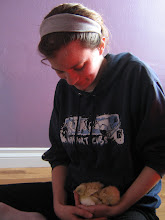Just in case you haven't heard much about us in Oregon, let me tell you a few things. Oregon is known for rain. This is because it rains A LOT. If you have Facebook friends in western Oregon, they probably comment on the rain. Unfortunately, because we don't realize our blessing, you probably see people even whine about our rain. We also have lakes, rivers, and streams in abundance.
However, even we have need to be concerned about water! (See this site for more details if you are interested.)
I think that this issue is largely ignored because, like most other environmental issues, it is downright inconvenient! We love our faucets, our showers, our sprinklers, and yes, our toilets! Of course, it is not just home use that causes problems. It is also industrial and farm use. However, it will be easier for the companies and farmers to solve their water issues if the public is supporting them.
This is a huge topic, so I'm just going to try to pique your interest. If you want more information, please look the topic up online. Wikipedia has an article on the water crisis, and the World Water Council might be another good place to start. I will go ahead and give a brief list of the problems that the world is seeing:
- Desertification (land that once was not bone dry is becoming bone dry)
- Disappearance of rivers and streams
- Loss of wildlife as rivers and streams diminish and disappear or become polluted
- Water pollution caused by ill-managed waste including human, industrial, agricultural waste
- Groundwater being overdrawn
Water is amazing stuff, and I feel completely blessed because of the beautiful, clean water that comes out of our faucet. However, I hope that you will consider joining me in trying to have a healthy relationship with water instead of a selfish one.
Here are a few ways that you might be able to help alleviate the problem:
- Develop an attitude of appreciation for your clean water, and learn to conserve the resources around you.
- Minimize irrigation. Allow your lawn to grow brown during the summer and/or grow primarily native plants or at least plants that will not require irrigation. Aim to irrigate only your food garden. When irrigating, use water-saving systems like drip irrigation.
- Spend less time in the shower. Turn off the water while you are lathering or scrubbing.
- Eat less meat. One source that I found estimates that 2500 gallons of water goes into making one pound of beef whereas a pound of wheat requires 25 gallons. No matter what source, you will find that meat requires far more water because of all of the feed that it takes to produce the pound of meat. The exception might be meat grown in a natural, well-managed pasture. However, if you are buying meat from the store, this is probably not what you are getting.
- Flush less water. Consider not flushing every single time. Put up to a half gallon jug filled with water into your tank to use less water each flush. Next time you need a new toilet, consider getting a low-flush toilet.
- Turn off the faucet unless you absolutely need it. Use the scrub brush to get the food off your plates. Leave the water off while you are rubbing the soap on your hands. Use the broom to clean the driveway instead of the hose.
- Fix leaky faucets... toilets... etc...
- Run only full loads in the dishwasher!
- Only wash clothes when they actually need it.
- Spread understanding and concern about future water issues. If a big group of us get on board, we can see great change.
(For more tips, go here, or search online for ways to use less or conserve water.)

0 comments:
Post a Comment